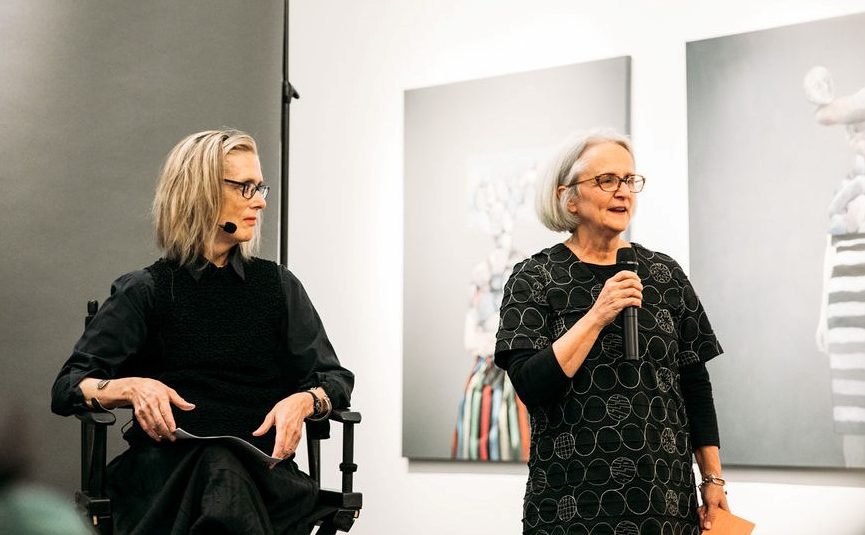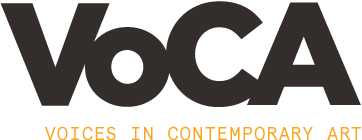
Jill Sterrett (right) speaks to the audience at the CALL/VoCA Talk: Lesley Dill held at Pen+Brush in NYC in 2019. Photo by Jules Slutsky.
Dear friends,
I hope this finds you, your family, and friends well.
When COVID-19 hit in March, many of us imagined we would be on our way to something more recognizable by August. Instead, if anything has become routine it is leaning into the uncertainty that lies ahead. Historians remind us that, throughout the course of time, pandemics have obliged people to break with the past in order to uncover new possibilities in our world. Today, the inequities of our country have been laid bare and each of us is called to respond. In an op-ed written for the Financial Times in April, Arundhati Roy, the Booker Prize winning author, created a visual image—that of the portal, a “gateway between one world and the next”—and implored and challenged each of us to think about what parts of this world we would choose to carry through that portal. This image sits on my shoulder every day and reminds me just how much, in these moments, I call on art to awaken the imagination, heal the soul, and connect people around our humanity.
What an honor it has been to serve Voices in Contemporary Art (VoCA) as Board President for the last six years! Thank you all for giving your time, your energy, your intelligence, and your passion to the stewardship of contemporary art. Working with the generous and dedicated people in this network has been a highlight of my career.
As I pass the baton to Chad Alligood, our incoming VoCA Board President, it is with profound respect for the values of equity that distinguish his career as an art historian and as a curator. Looking ahead, there are many reasons to believe the organization is poised to engage impactfully with this moment of change in the world.
- The founders of VoCA sought to diversify the people and voices who care for contemporary art. Today, that model includes artists, relies on interdisciplinary and intergenerational wisdom, and operates beyond the walls of arts institutions. Inclusion and access is in our DNA but we must do more to address the racial inequities at the heart of what we care for and how we care for it. This is our pledge.
- If VoCA has a superpower, it is engrained agility—two staff members, seventeen Board and Program Committee members, and a network of 20,000 people spanning six continents on the globe. The challenge ahead is to mobilize this network in service of change.
- Since its inception in 2007, VoCA has resisted the very membership models that erect financial barriers to entry. Becoming part of the network costs nothing. Join us today: https://voca.network/participate/.
- In the last six months, VoCA has expanded existing virtual platforms and activated new forms of remote learning and engagement to connect people in our network. Please check out those resources at: https://voca.network/voca-resources/.
- Most essentially, we are looking inward, and scrutinizing structural racism within our organization. We will be accountable to BIPOC communities and voices impacted by racial injustice.
VoCA operates under the inspired direction of Lauren Shadford who joined the organization in 2010. In the last ten years, Lauren has guided the formation of this interdisciplinary nexus for dialogue about the production, presentation, and preservation of art, transforming it from an idea to the sustainable platform that exists today. Thank you Lauren for setting the tone of collaboration each and every day and for making it the organization’s way of living. And to Margaret Graham, our steadfast Program & Communications Manager, thank you for all you do to realize VoCA’s programs. I am grateful.
So, as my tenure as VoCA’s Board President draws to an end, and at a time when each of us is called to respond with intention to the world we imagine on the other side of the portal, I invite you to join us—where the power of art can lead us to ask, with courage and hope, ‘what if?’.
Best,
Jill Sterrett
